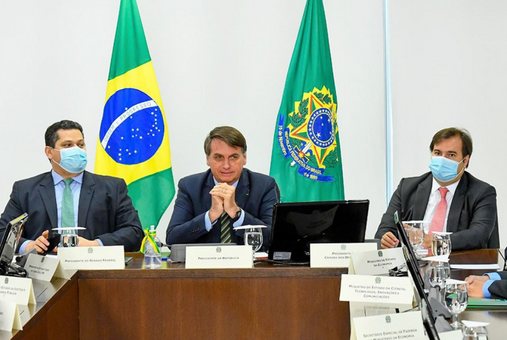Brazil saw a dystopia come true between 2020 and 2022: The outbreak of a pandemic while the country was led by a denialist president. From the first warnings regarding the coronavirus, former president Jair Bolsonaro made a point of expressing his contempt for health authorities' recommendations, repeating untrue statements about COVID-19 until the end of his term.
According to the fact-checking platform Aos Fatos, Bolsonaro made 1,383 false statements and 1,221 distorted statements about the coronavirus in his four years in office. Many of them ended up in the titles or headlines of major Brazilian news outlets without contextualization or correction, amplifying the denialist discourse of the then-president.
This trend was observed by Brazilian researchers in a study that analyzed 111 news headlines referring to Bolsonaro's false statements about COVID-19 in 2020, published by six of the country's largest news media. In 60.36% of the cases, the falsehoods said by Bolsonaro were simply reproduced in the headlines. In 26.13% of the cases there was some contextualization, and only 13.51% of the news had in its title a correction of the then-president's speech. With such a practice, journalism would be involuntarily contributing to “the spread of mis- or dis-information online, in some cases increasing the noise in an already polluted and high-choice media environment.”
This is one of the observations of the study "All the President's Lies: How Brazilian News Media Addressed False and Inaccurate Claims in Their Titles." Published by the Journalism Practice journal in February, the authors are Marília Gehrke (University of Southern Denmark - SDU, in its Danish acronym), Marcelo Träsel (Federal University of Rio Grande do Sul - UFRGS), Álvaro Ramos (UFRGS), and Júlia Ozorio (UFRGS).

Jair Bolsonaro (center), then Brazil's president, during a meeting in Brasília in May 2020, three months into the pandemic. (Photo credit: Marcos Brandão/Senado Federal)
“Writing proper titles is a fundamental ethical discussion in times of platformization of journalism,” wrote the authors, since a large part of the public has contact with the news through links shared on other platforms, such as social media and messaging applications.
“Given that a portion of the audience will not even open the hyperlinks to read complete news stories, it concerns that only fragments of a fact will be gathered. This is why providing straight and accurate information is fundamental to any news coverage, especially when there are important topics and international crises, such as the pandemic,” they stated.
In this sense, the authors observed that “it does not matter much if the text body of a news article is correct if the title is inaccurate or sensationalist because it will generate misleading information.”
Researcher Marilia Gehrke, who is doing a post-doctorate at the Digital Democracy Centre (DDC) at the SDU, told LatAm Journalism Review (LJR) that one of the questions she receives most in class and in lectures is about the role of journalism in the dissemination of misinformation. For her, this questioning is also related to the public's perception of the possible incongruence between the title and the text of a news story.
"When we see comments on social media or news portals, we notice a certain dissatisfaction from readers. They sometimes feel deceived and write things like 'Ah, that was just a clickbait and here I am reading it' (...) We had this anecdotal evidence that journalism might not be fulfilling its role, but we needed to measure this in some way. If journalism is really being part of this noise, what do we look at? We decided to look at the headlines, because that's where the clickbait happens,'" Gehrke said.
To do so, the researchers selected 21 "significant episodes of disinformation" involving Bolsonaro in 2020, the first year of the pandemic, based on the most repeated false statements by him according to a cross-check conducted by Aos Fatos. Then they checked whether these episodes were reported by at least three of six Brazilian news media: Folha de S.Paulo, O Estado de S. Paulo and O Globo, printed newspapers classified as "legacy media," or "traditional press," and the portals G1, Terra and UOL, classified as digital natives. All are mentioned in the Reuters Institute's Digital News Report 2021 as prominent news media in Brazil.
The researchers then analyzed 111 news titles from these six media about episodes of misinformation starring Bolsonaro. More than half of the titles were classified as mere reproduction (60.36%), followed by contextualization (26.13%) and correction (13.51%).
A little more than half (53.15%) of the titles carried Bolsonaro's false and inaccurate statements in quotes. “That could either mean the presence of a strategy to catch the readers’ attention or that journalists might not feel comfortable using their own words to narrate a fact. (...) To protect themselves against errors and confrontation with official sources, journalists often reproduce, without criticism, authorities’ allegations and opinions,” wrote the researchers in the article.

Researcher Marília Gehrke is the study's main author. (Photo credit: Denis Paul)
“When journalism is more concerned with obtaining clicks than accurately communicating the truth, some journalistic fundamentals, such as ethics, objectivity, and transparency, are at risk. In this case, journalism loses its purpose and increases the noise in an environment full of misleading content,” the authors observed.
With the exception of Terra, the other five media analyzed in the research were part of a consortium of news outlets formed to collect and disseminate COVID-19 data in Brazil, which operated between June 2020 and January 2023. According to the researchers, although these newsrooms were part of the consortium, “they still neglected the writing of news titles, exposing the public to false or misleading claims.”
Gehrke noted that, "although newspapers often explain [the speech highlighted in a headline] in the deck or in the text, still, when they put a statement by a politician in quotation marks in the headline, it's to draw attention [to what was said], and a lot of people will only read that."
"We believe that this practice should be rethought. Not everyone will open the news to read the whole thing, and sometimes the paywall comes in and the person can't even finish reading the deck," said the researcher.
Gehrke pointed out that the study did not analyze the news production processes, so it is not possible to establish the reasons why newsrooms chose to publish such headlines.
"Often, the reporter who writes the news is not the person who is going to make the title. Or one person will do a title for the newspaper and a digital editor will do a title just for the website. So it's hard to say why exactly they made those choices. I've worked as a reporter and I know the complexity; sometimes the reporter who gathered the information wants to frame it a certain way or write a certain type of headline and the editor disagrees and thinks that another title will look better because it goes better with a photo of Bolsonaro coughing, let's say," the researcher said.
One hypothesis is the attempt to capture readers through outrage, "by exposing something ridiculous that the [then] president said," Gehrke commented. "But a lot of people are going to read that literally and not try to go beyond it (...) So we think that the people in the newsroom need to do a little rethinking. In this environment of misinformation, we can no longer do declaratory journalism, simply reproducing quotation marks, no matter how much the intention is to cause outrage or indignation, to expose the ridiculous. You can no longer do it this way," she said.
For Gehrke, the underlying problems in this issue are the challenge of financing journalism and the precarious nature of the work in increasingly leaner newsrooms, with overworked professionals who are subject to pressure from metrics, such as the number of clicks and page views.
"Maybe the title, for those who are in the newsroom, is the least of the problems, and it's almost an automatic process. So it's very difficult to hold the reporter or even the editor responsible. To what extent does that editor also respond to a chain of command about which he doesn't have much to do? (...) I'd have to check, but if I had to bet, I'd say it's the worsening work conditions, haste, pressure from metrics, and pressures from all sides. Because, honestly, it's not easy," she said.
However, neglecting the headline can end up exacerbating these problems, as it fosters misinformation and undermines the credibility of journalism. Interestingly, on Twitter, there were comments stating that the study led by Gehrke showed that "journalism misinforms," an interpretation refuted by the researcher.
"We don't mean at any point that you don't need journalism or anything like that. We really need serious people who go after the verifiable truth, who show their methods, check more than once and verify each piece of information. The idea is not to say 'ah, so journalism is useless.' Because we also saw in this study that journalism not only reproduces, but sometimes contextualizes and disproves a statement on the spot, and puts it in the title. If we think about the quality of information, we do need good journalism. And journalism needs to be more transparent, including in the title," she said.